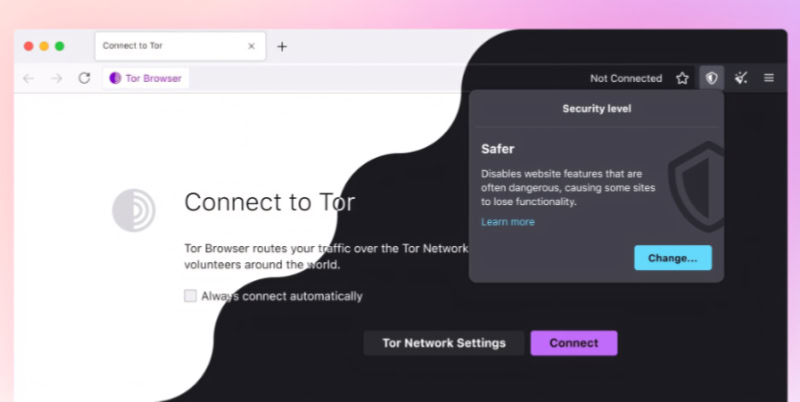Surface Web vs. Deep Web vs. Dark Web: Explained Simply

The internet is far more complex than most people realize, extending well beyond the easily searchable websites we use every day. Beneath the familiar surface lies a hidden world of unindexed information and anonymous networks.
These layers, known as the Surface Web, Deep Web, and Dark Web, each serve distinct purposes, from everyday browsing to private communications and, in some cases, unlawful activities.
Defining the Three Layers
The internet can be compared to an iceberg, with its visible tip representing only a fraction of its full scope. The vast majority of online content exists below the surface, serving different purposes and accessible through varying levels of effort.
From the easily searchable and widely used Surface Web to the hidden yet essential Deep Web and the encrypted, secretive spaces of the Dark Web, each layer contributes to the internet’s overall structure.
Surface Web
The Surface Web is the part of the internet most users interact with daily. It includes publicly accessible websites that are indexed by search engines like Google, Yahoo, and Bing.
Social media platforms, online news articles, blogs, and even educational resources are all part of this layer. Anything that can be found with a simple keyword search or clicked on without the need for special permissions exists within this space.
Though it is the most familiar part of the internet, the Surface Web represents only a small portion of its overall size, estimated to account for just 5 to 10 percent. Its accessibility and public-facing nature make it the “face” of the internet for most people, but its limited scope barely scratches the surface of the digital information housed online.
Deep Web
Beneath the Surface Web lies the expansive Deep Web, a much larger and more private part of the internet. Unlike the Surface Web, the Deep Web contains information that is not indexed by search engines.
Accessing this layer often requires specific credentials, such as usernames, passwords, or subscriptions.
The Deep Web includes a vast range of content that is essential for everyday life. Examples include private email accounts, medical records stored on secure hospital networks, and financial information in online banking systems.
Subscription-based services such as streaming platforms and journal databases also fall within this layer. Government records, corporate data, and educational tools stored behind virtual walls are all part of the Deep Web as well.
Despite sometimes being confused with the more secretive Dark Web, the Deep Web is mostly used for legitimate purposes. It makes up an estimated 90 to 95 percent of the internet and plays a crucial role in maintaining privacy, protecting data, and enabling a wide range of professional and personal activities.
Dark Web
The Dark Web represents an intentionally concealed part of the Deep Web, accessible only through specialized tools such as the Tor browser or I2P (Invisible Internet Project). Unlike the rest of the internet, which operates on traditional domains, the Dark Web is built on encrypted networks that enable complete anonymity for its users.
This layer is often associated with illegal activities, but it also serves legitimate purposes. Activists, journalists, and whistleblowers use it to communicate securely in countries with oppressive regimes.
Platforms like SecureDrop, for example, offer a way to share sensitive information without revealing identities. However, its reputation is largely shaped by the presence of black markets, hacking forums, and other illicit operations that exist in this shadowy corner of the internet.
The Dark Web is much smaller than both the Surface and Deep Web, yet it continues to draw attention due to its mysterious nature. It provides both an opportunity for privacy and a risk of exploitation, creating a space where ethical debates and security challenges abound.
Access Methods and Anonymity

The way individuals access the different layers of the internet varies significantly, depending on the structure and purpose of each layer. Access methods range from straightforward browsing through search engines to the use of specialized tools for navigating hidden or restricted content.
Anonymity also differs across these layers, from minimal privacy on the Surface Web to highly encrypted, anonymous access on the Dark Web.
Surface Web
Accessing the Surface Web is the simplest and most straightforward process. Standard web browsers such as Google Chrome, Mozilla Firefox, or Safari make it easy to search for and access public websites.
No special tools or knowledge are required, as the content on the Surface Web is indexed by search engines and openly accessible to anyone with an internet connection.
However, anonymity on the Surface Web is virtually nonexistent. User activity is typically tied to an IP address, which can be easily tracked by internet service providers, website administrators, and third-party entities.
Additionally, search engines and websites often collect data on browsing habits, allowing them to serve personalized ads or track online behavior. This lack of privacy means most activities performed on the Surface Web are far from anonymous.
Deep Web
Accessing the Deep Web requires a different approach, as its content is not indexed by search engines. Instead of simply typing a query into a search bar, users must enter password-protected portals or subscription-based platforms.
Examples include logging into online banking systems, accessing academic databases, or viewing private email accounts. Each of these actions requires specific credentials, such as usernames and passwords, to unlock content that is otherwise hidden from public view.
While the Deep Web offers more privacy than the Surface Web, it does not guarantee full anonymity. Access is often tied to personal accounts, meaning user activity can still be traced back to the individual through login credentials.
For instance, online transactions or communication within secure systems may leave digital footprints. However, the use of encryption within many Deep Web platforms offers a layer of protection for sensitive information, making it more secure than the openly accessible Surface Web.
Dark Web
Gaining access to the Dark Web requires specialized tools and knowledge, as it operates on encrypted networks that are intentionally hidden from traditional search engines. The Tor browser is the most commonly used tool for navigating the Dark Web, though other networks like I2P (Invisible Internet Project) are also available.
These tools enable users to bypass conventional web protocols and access “.onion” or similarly hidden sites.
Anonymity on the Dark Web is significantly higher than on other layers of the internet. Multi-layered encryption hides user identities and locations, making it difficult for third parties to monitor activity or trace it back to individuals.
The focus on privacy attracts a wide range of users, from activists and journalists seeking secure communication to individuals engaging in illegal activities. While anonymity is a prominent feature of the Dark Web, using it still carries risks, as malicious actors often exploit its secretive nature to target unsuspecting users.
Risks and Security Implications

Each layer of the internet comes with its own set of risks, ranging from phishing scams on the Surface Web to sophisticated threats on hidden networks like the Dark Web. The widespread use of the internet means that vulnerabilities can affect anyone, often leading to stolen personal data, financial losses, or other serious repercussions.
Addressing these risks requires an awareness of the threats at each level, as well as proactive strategies to enhance security.
Surface Web Vulnerabilities
The Surface Web, while accessible and convenient, presents several risks for users. Phishing attacks are among the most common threats and often involve fraudulent emails or websites designed to steal sensitive information such as passwords or credit card details.
Malware can also be distributed through suspicious links, downloads, or compromised websites, potentially damaging devices or exposing personal data.
Misinformation is another growing concern on the Surface Web. Social media platforms and news websites can sometimes spread false or misleading information, creating confusion or influencing opinions on important topics.
With so much publicly accessible content, the Surface Web provides an easy entry point for malicious actors aiming to exploit unsuspecting users.
Deep Web Threats
While primarily used for legitimate purposes, the Deep Web carries risks stemming from the type of information it houses. Private data, such as medical records, financial information, and corporate details, can become targets for hackers.
Data breaches pose a significant threat, as cybercriminals often exploit vulnerabilities in secured systems to access and leak sensitive information.
Credential management is crucial on the Deep Web, as user accounts are typically protected by passwords and other access controls. Weak or reused passwords can make it easier for attackers to gain unauthorized entry to accounts or systems, emphasizing the need for stronger security measures.
The confidentiality of private data in the Deep Web relies heavily on how well these platforms protect their users and how vigilant individuals are in safeguarding their credentials.
Dark Web Dangers
The anonymous nature of the Dark Web opens the door to more severe risks, particularly for those unfamiliar with its operations. Scams are a common issue, with sellers on illegal marketplaces often defrauding buyers or delivering malicious software instead of advertised goods.
Malware is another frequent danger, as downloads on the Dark Web can contain hidden viruses that compromise a user's device or data.
Illegal activity is prevalent in this layer, including the sale of drugs, counterfeit goods, weapons, and stolen information. Engaging in these markets not only endangers personal safety but also carries serious legal consequences.
Even browsing the Dark Web without participating in illicit activities can be risky, as users may inadvertently access illegal material or fall victim to scams orchestrated by cybercriminals.
Mitigation Strategies
Proactive measures are essential for reducing the risks associated with all layers of the internet. Virtual private networks (VPNs) help protect online activity by encrypting user data and masking IP addresses, allowing for secure and private browsing.
Multi-factor authentication (MFA) adds an extra layer of protection for accounts by requiring additional verification beyond just a password.
Dark web monitoring tools provide a way to track stolen information, such as leaked email addresses or passwords, and can alert users if their data is being sold or misused online. Strong password habits, such as creating unique, complex passwords for each account, further protect against unauthorized access.
Combining these strategies improves personal security and minimizes the risks posed by malicious actors across the Surface Web, Deep Web, and Dark Web.
Societal Roles and Ethical Debates

Each layer of the internet plays a significant role in society, influencing fields such as education, advocacy, and criminal activity. While much attention is drawn to the illicit uses of certain layers, there are also numerous legitimate functions that enable progress, protect privacy, and foster communication.
The ethical challenges posed by the internet’s layered structure raise complex questions about privacy, accountability, and the broader implications of anonymity tools.
Legitimate Uses
The Deep Web serves as a backbone for essential day-to-day functions in academic and corporate settings. Academic databases, such as JSTOR and other subscription-based platforms, offer access to peer-reviewed research, enabling scholars, students, and professionals to access vital information.
Corporate intranets housed within the Deep Web provide secure portals for sharing internal communications, conducting business transactions, and storing confidential data. These legitimate uses play a vital role in advancing industries while safeguarding sensitive materials.
On the Dark Web, legitimate uses revolve around privacy and security. Whistleblower platforms, such as SecureDrop, allow individuals to report misconduct or corruption without fear of retaliation.
Privacy advocates and journalists working in authoritarian environments often rely on encrypted networks to communicate without being monitored. For those living under oppressive regimes, the Dark Web can serve as a lifeline to freedom of speech and secure information-sharing, highlighting its value beyond its criminal associations.
Illicit Activities
Illicit uses, particularly on the Dark Web, generate significant concern due to their impact on individuals and society. Online markets for drug trafficking, hacking services, and counterfeit goods thrive in this hidden space, protected by anonymity.
These marketplaces often facilitate the trade of unauthorized materials, such as stolen credit card numbers or personal data, enabling cybercriminals to profit while remaining hidden.
Hacking forums and malicious software distribution are other major threats on the Dark Web. These platforms allow criminals to exchange tools and knowledge for launching attacks against corporations, governments, or individuals.
The ability for such activities to exist in an encrypted, anonymous environment demonstrates the challenges law enforcement faces in addressing crimes on this layer of the internet.
Ethical Dilemmas
The internet’s layered structure gives rise to challenging ethical questions, particularly regarding the balance between privacy and law enforcement. Anonymity tools, while empowering activists and whistleblowers, also shield criminals engaging in illegal activities.
Governments and regulators are often torn between protecting the rights of individuals to maintain privacy and freedom of expression and their responsibility to prevent crimes facilitated by concealed online platforms.
The dual nature of anonymity tools highlights another ethical complexity. Encryption technologies provide safety for dissidents and journalists facing persecution but can also hinder investigations into crimes such as human trafficking or terrorism.
Policymakers, technology developers, and society as a whole grapple with how to manage this balance responsibly, sparking ongoing debates about the trade-offs between safety, security, and individual freedoms.
Conclusion
The internet's layered structure, divided into the Surface Web, Deep Web, and Dark Web, serves distinct purposes while presenting unique opportunities and risks. The Surface Web is the most familiar layer, limited to publicly accessible and indexed content.
Below it lies the expansive Deep Web, which safeguards sensitive and private information behind secure and often crucial platforms. Finally, the Dark Web stands as the most controversial layer, offering both anonymity tools for privacy advocates and a haven for illicit activities.
These layers collectively shape our digital experiences and influence societal dynamics, from advancing education and protecting whistleblowers to enabling cybercrime and fostering ethical debates. As the internet continues to evolve, ensuring safe and secure interactions across its layers remains critical.
Proactive measures such as using VPNs, multi-factor authentication, and maintaining awareness of potential risks allow users to engage responsibly in this interconnected digital landscape. Emphasizing both security and ethical considerations will ensure that the internet remains a tool for progress while minimizing its potential for harm.


